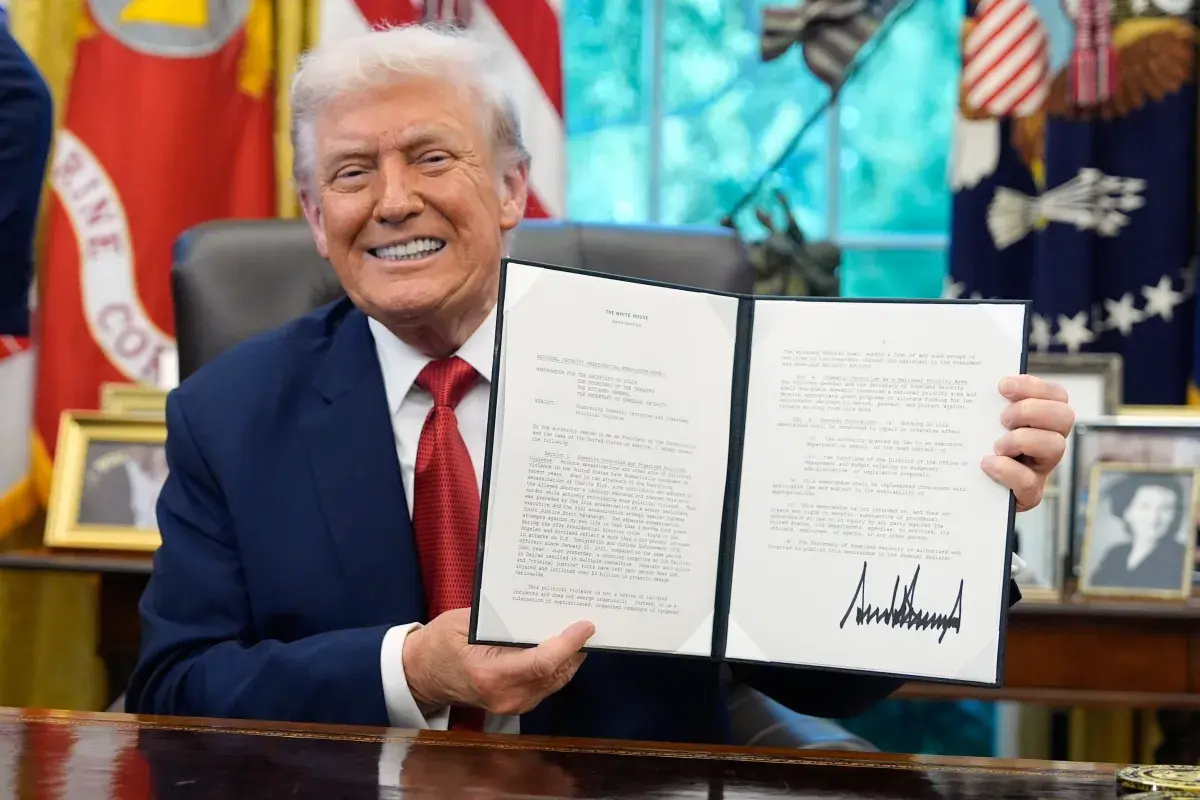
President Donald Trump’s approval rating among women voters appears to be rebounding slightly after hitting a low point in August, according to new polling data.
In July, women gave the president a 31 percent approval and 65 percent disapproval rating (-34 net), according to Quinnipiac University polling. By August, that figure slipped to 29 percent approval and 65 percent disapproval (-36 net), the lowest point in months. But September’s polling shows a modest recovery, with 32 percent approving and 61 percent disapproving (-29 net).
While the numbers suggest some stabilization, the polling was conducted before Trump’s recent remarks about Tylenol use during pregnancy, which have already drawn scrutiny from medical experts and could affect future support among women.
Women’s Issues Take Center Stage in Trump’s Second Term
Since returning to the White House in January 2025, Trump has repeatedly made women’s issues and gender policy a centerpiece of his agenda—often in ways that triggered fierce backlash.
On his first day, he signed an executive order requiring federal agencies to define sex strictly as male or female and roll back protections for transgender people. Days later, he banned transgender individuals from serving in the military, a move tied up in court but allowed to proceed. In February, Trump expanded these efforts with measures aimed at “keeping men out of women’s sports,” and by mid-summer, his administration issued guidance directing agencies to enforce sex-based distinctions in personnel and workplace policies.
Polling suggests women voters reacted negatively. In YouGov/Economist surveys, Trump’s approval among women slid from 43 percent approve/47 percent disapprove in January (-4 net) to 43 percent approve/50 percent disapprove in March (-7 net).
The sharper decline was seen in Quinnipiac polling, where women’s approval fell from 36 percent approve/53 percent disapprove in January (-17 net) to just 32 percent approve/63 percent disapprove in March (-31 net), a double-digit drop in two months.
In September, Trump turned his attention to maternal health, warning pregnant women against taking Tylenol and suggesting it could be linked to autism. His administration announced new research initiatives and ordered the FDA to review labeling, even as medical experts said the claims were misleading and not supported by scientific consensus. How this episode will affect Trump’s standing with women remains uncertain.
Trump has a long record of incendiary remarks about women, ranging from political rivals to public figures and even allies’ spouses.
On the campaign trail, Trump repeatedly targeted then-Vice President Kamala Harris, questioning her intelligence and mental fitness. At a rally in Erie, Pennsylvania in 2024 he called Harris “mentally impaired,” claimed she was “born that way,” and described her as “Lyin’ Kamala Harris,” before adding, “Something’s wrong … there is definitely something missing.” At other events, he has mocked her with labels such as “dumb,” “low IQ,” and “stupid.”
His insults have extended beyond politics. In 2018, after a judge dismissed adult film actress Stormy Daniels’ defamation lawsuit against him, Trump called her “horseface” on social media, prompting widespread backlash.
Even in diplomatic settings, Trump has drawn criticism for comments about women’s appearance. During a 2017 state visit to Paris, he greeted French First Lady Brigitte Macron by remarking, “You’re in such good shape,” repeating it before adding “Beautiful” — comments widely reported by international outlets at the time.
Trump has also been reported to offer advice to men facing allegations of misconduct. In Bob Woodward’s book Fear: Trump in the White House, Trump is quoted telling a friend accused of inappropriate behavior: “You’ve got to deny, deny, deny and push back on these women. If you admit to anything and any culpability, then you’re dead. … You’ve got to push back hard … Never admit.”
Trump’s history of disparaging comments about women has also been underscored by a long line of sexual misconduct allegations which he has consistently denied.
Mike Tappin, an honorary fellow at Keele University and co-author of American Politics Today, told Newsweek that this explains why the majority of women have not voted for Trump in the past. “Hardly presidential, or even respectful. You can understand the gender gap,” he said.
Gains on the Economy and Trade
But polling shows that Trump is regaining some ground with women on the economy and trade.
On the economy, Trump’s net approval among women fell to -37 in August, but it rebounded sharply to -27 in September, his strongest showing since July. The same pattern emerged on trade, where his rating dropped to -36 in August before improving to -28 this month.
This recovery comes as broader polling shows women souring on Trump’s economic leadership. YouGov/Economist surveys show that his approval rating on jobs and the economy among women fell from 34 percent in mid-August to 29 percent in September, while disapproval climbed from 56 percent to 60 percent. Regarding inflation, approval dropped from 27 to 25 percent, while disapproval increased from 64 to 67 percent.
Inflation pressures remain a major factor. Consumer prices rose at the fastest pace since January in August, although new government data shows that economic growth is stronger than initially thought.
Gross domestic product grew at an annual rate of 3.8 percent from April through June, the Commerce Department said Thursday, up from the earlier estimates of 3.3 percent and 3 percent.
The revision was driven by higher consumer spending than previously reported. Personal consumption rose at an annual pace of 2.5 percent in the second quarter, compared with the earlier estimate of 1.6 percent.
Persistent Weakness on Foreign Policy
But while Trump has clawed back some support on domestic issues like the economy and trade, he continues to struggle badly on foreign policy matters—particularly the wars in Ukraine and Gaza.
Trump gained ground on foreign policy more broadly, improving from a -33 rating in August to a -26 rating in September. Still, on the specific crises dominating headlines, women remain far less supportive. His net approval on the Russia-Ukraine war deteriorated to -33 in September, down from -28 the previous month. Meanwhile, his handling of the Israel-Hamas war continues to weigh heavily on his numbers, with a net rating of -33, a modest improvement from August but well below his July standing.
According to the Quinnipiac poll, 67 percent of women say that supporting Ukraine is in the national interest. Some 46 percent say the same about Israel, while 40 percent say it’s not.
Trump’s positions on the wars in Ukraine and Gaza have shifted notably throughout 2025.
On Ukraine, Trump has toughened his public stance against Russia. In recent weeks, he has declared that “Ukraine can win back all territory lost to Russia…in its original form” with support from NATO and the European Union, while deriding Moscow as a “paper tiger.”
This represents a shift from earlier in the year, when he entertained negotiations over territorial concessions and positioned himself as a potential mediator between Russian President Vladimir Putin and Ukrainian President Volodymyr Zelensky.
In the Middle East, Trump’s stance on Israel and Gaza has also evolved. Over the summer, he announced that Israel had agreed to conditions for a 60-day ceasefire and later rolled out a 21-point peace plan that included provisions for Israeli withdrawal from parts of Gaza.
More recently, he drew a firm line by stating he “will not allow Israel to annex the West Bank,” marking a sharper departure from his earlier habit of deferring major decisions to Israeli leadership. At the same time, Trump continues to emphasize his support for Israel and prioritize hostage release, while rejecting international moves to recognize Palestinian statehood, which he described as rewarding Hamas.
Volatility in Approval Ratings
But experts caution that the month-to-month swings in Donald Trump’s approval ratings may not signal a lasting shift in public opinion.
“I believe this small shift does not mean much. There is no real difference between 29 and 32 because of the margin of polling error. Trump is underwater more with women than men because of cuts to Medicaid, cuts to food assistance, cuts to violence shelters, rising prices at the grocery store – and his extreme rhetoric – which all contribute to his very low rating with women,” Carrie Baker, professor of women, gender and sexuality at Smith College, Massachusetts, told Newsweek.
In YouGov/Economist polling from earlier this month, Trump’s overall approval rating hit an all-time low of -18 points after it had been steadily improving for the past 3 months. The latest poll showed Trump’s approval rating creeping back up to -17 points.
The same trend has been observed in Quinnipiac polling, with Trump’s overall net approval dropping to -18 points last month, down from -14 points the month before. His net approval now stands at -16 points, with 38 percent approving and 54 percent disapproving.
“The back and forth of Trump approval could reflect reversals in his fortune during quickly changing news cycles, or regression to the mean as Americans on the fence about him change their minds from week to week,” YouGov data journalist David Montgomery wrote in a blog post.
Montgomery added that we will only be able to tell if the drop in Trump’s approval rating is a genuine trend if it continues to fall.
“The way to tell if a big drop such as the one Trump’s net approval took in the September 12—15 poll reflects a real change in how Americans view Trump, as opposed to random noise, is to wait and see if the trend continues. If Trump’s approval rating falls again next week—or stays about where it is—that will suggest something real is at work. But if it bounces back up, that will suggest his drop this week was more likely a blip than a major change,” he wrote.



